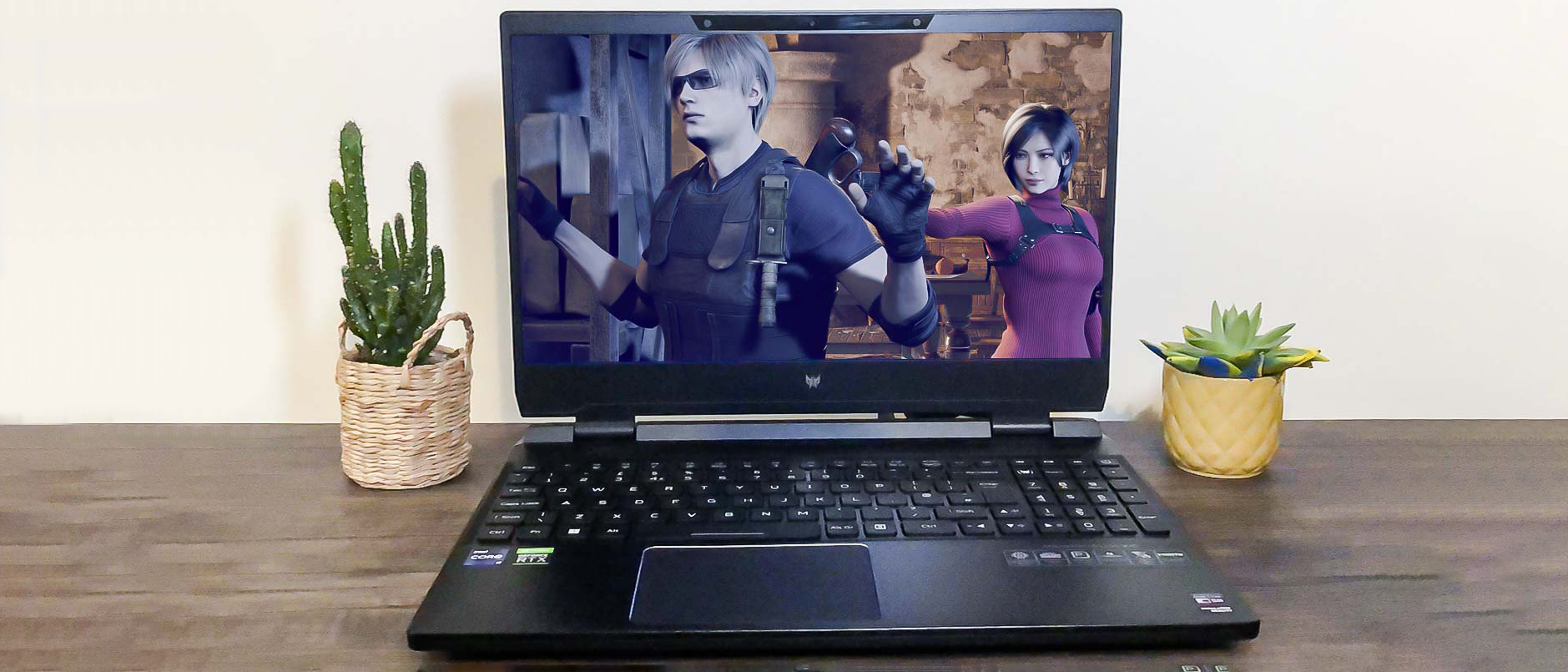Tom's Guide Verdict
A powerhouse gaming laptop that can handle even the most demanding big-budget titles. Noise and heat output are real issues though, meaning this is not a laptop that’s always suited for day-to-day productivity.
Pros
- +
Brilliant 4K gaming performance
- +
Screen shows up fine details incredibly well
- +
Solid build quality
Cons
- -
Way too noisy, even when not gaming
- -
60Hz refresh rate is limiting
- -
Poor battery life
Why you can trust Tom's Guide
Price: $3,449 as tested
CPU: Intel Core i9-12900H
GPU: Nvidia GeForce RTX 3080
Display: 15.6-inch (3,840 x 2,160) IPS
RAM: 32GB
Storage: 1TB
Ports: 1X Thunderbolt/USB-C, HDMI 2.1, 3.5mm audio, Mini DisplayPort 1.4
Dimensions: 14.14 x 10.81 x 1.09 inches
Weight: 6.6 pounds
The Acer Predator Helios 300 SpatialLabs Edition (phew!) is a hugely powerful gaming laptop that can easily handle even the most demanding titles at 4K. It also boasts some nifty (if slightly throwaway) 3D features.
After a week testing Acer’s powerful laptop, there’s no denying its gaming credentials. This is a monster of a machine that boasts specs competitive with some of the best gaming laptops.
Sadly, and despite impressive CPU stats, the Helios’ sheer size means it’s not always well suited to productivity tasks, especially if you’re on the go.
The Helios 300’s knockout gaming performance also comes at a high price. I’m not just talking about cost, either; you’ll also pay for the privilege through a combination of poor battery life, eardrum-rupturing fans and a bulky frame that makes this laptop feel like a kettlebell every time you pick it up.
Acer Predator Helios 300 review: Price and configuration
- Cheapest unit costs $3,499
- More expensive model with RTX 4080 is available
The Acer Predator Helios 300 Spatial Labs is available to buy now in both the US and the UK. You can either purchase this laptop from Acer’s website or via select third-party retailers.
The specific model we’re reviewing costs $3,499 / £3,299. That’s undoubtedly a steep outlay, but for that you get a 15.6-inch 4K (3820 x 2160 pixels) IPS panel, a 12th Gen Intel Core i9-12900H processor, an Nvidia GeForce RTX 3080 laptop GPU, 32GB of DDR5 RAM and a 1TB NVMe SSD for storage. This laptop also comes pre-installed with Windows 11 Home.
Acer has informed us there’s also a version of the Helios 300 that comes with an RTX 4080 GPU, but at time of writing the company had yet to provide us with pricing details for this model.
Acer Predator Helios 300 review: Design
- Big, bulky and well made
- Weighs an unreasonable amount
There’s no getting around it: the Helios 300 is a beefy boy. The chonk is real with this laptop. Unless you’re looking for a strenuous bicep workout, you shouldn’t be picking up this 6.6-pound beast with one hand.
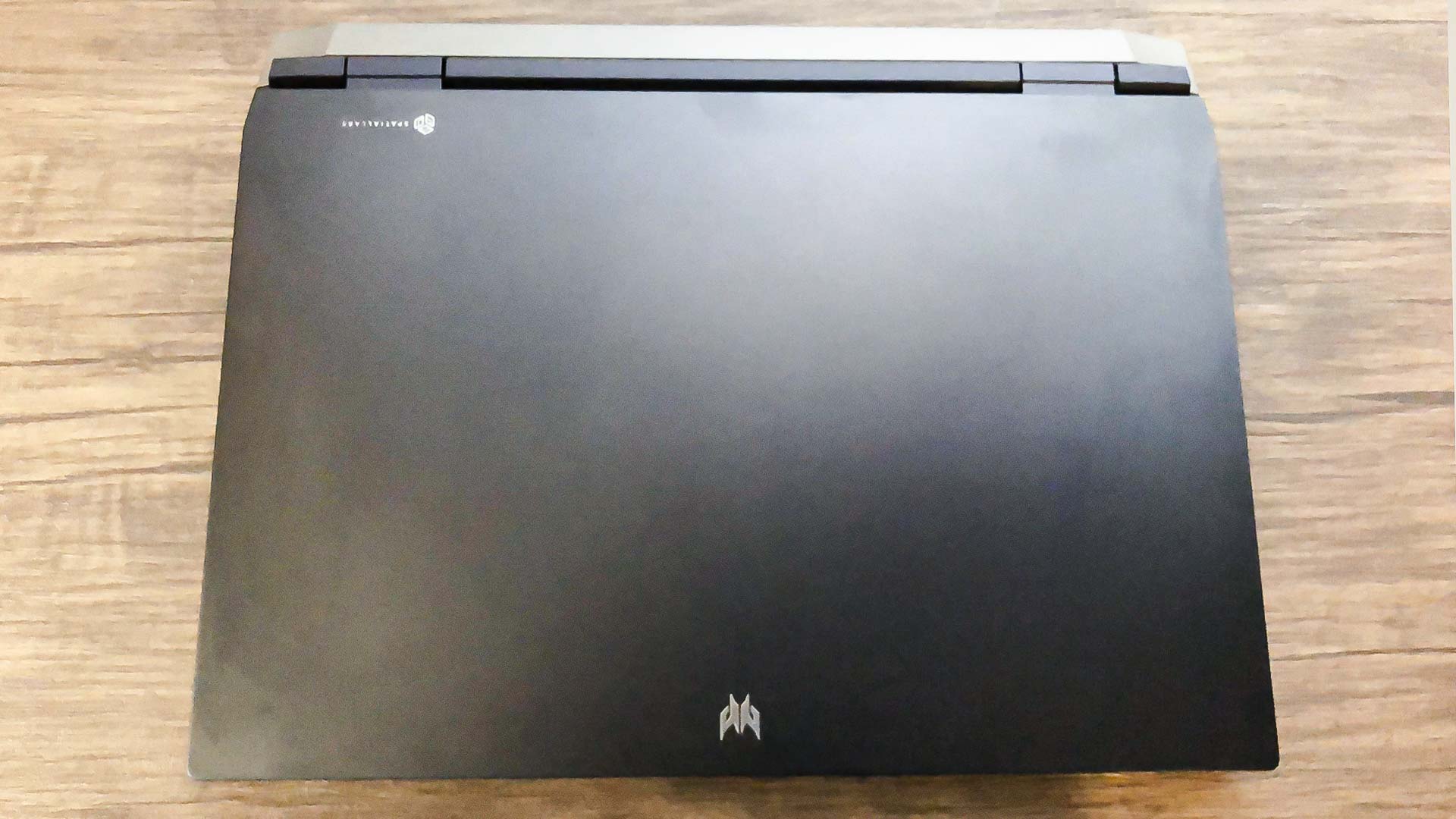
This year’s Helios doesn’t do subtle. Big, bold and often extremely noisy, it’s a battering ram of a laptop that demands your attention at every turn. While I quite like its ‘Abyssal Black’ metallic finish, it’s an utter fingerprint magnet. Every time I move between rooms with this behemoth, I find myself breaking out a microfiber cloth to give its shell a thorough clean.
The Helios 300 doesn’t have a touchscreen, which normally I’d be a little sad about. Considering I’ve besmirched this laptop’s exterior with my greasy digits dozens of times during the review process, I’m not overly sad my mucky paws don’t have another excuse to gunk up its pristine 4K display.
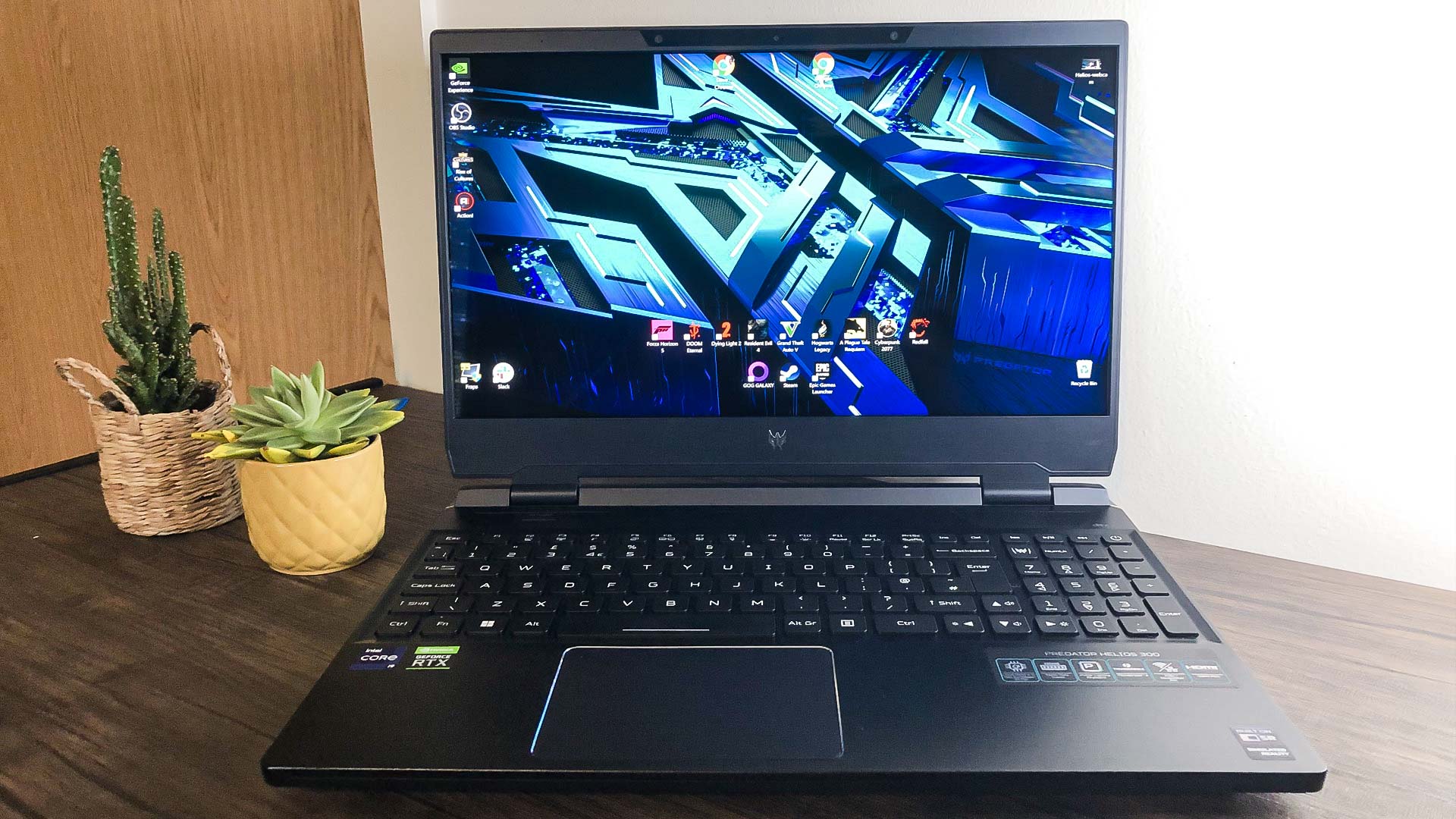
Despite its sheer girth, the Helios 300’s lid is easy to open. I also dig its slimmed down side bezels, which almost make games look like they’re floating in mid-air when you’re playing on Acer’s brute.
Acer Predator Helios 300 review: Display
- Colorful display is let down by subpar brightness
- 4K screen delivers an incredibly sharp experience
Despite delivering pin-sharp pictures, the 15.6-inch 4K (3,820 x 2,160) LCD screen on our Helios 300 review unit leaves something to be desired. Though color performance is strong the display never gets particularly bright, meaning it rarely impresses when it comes to contrast.
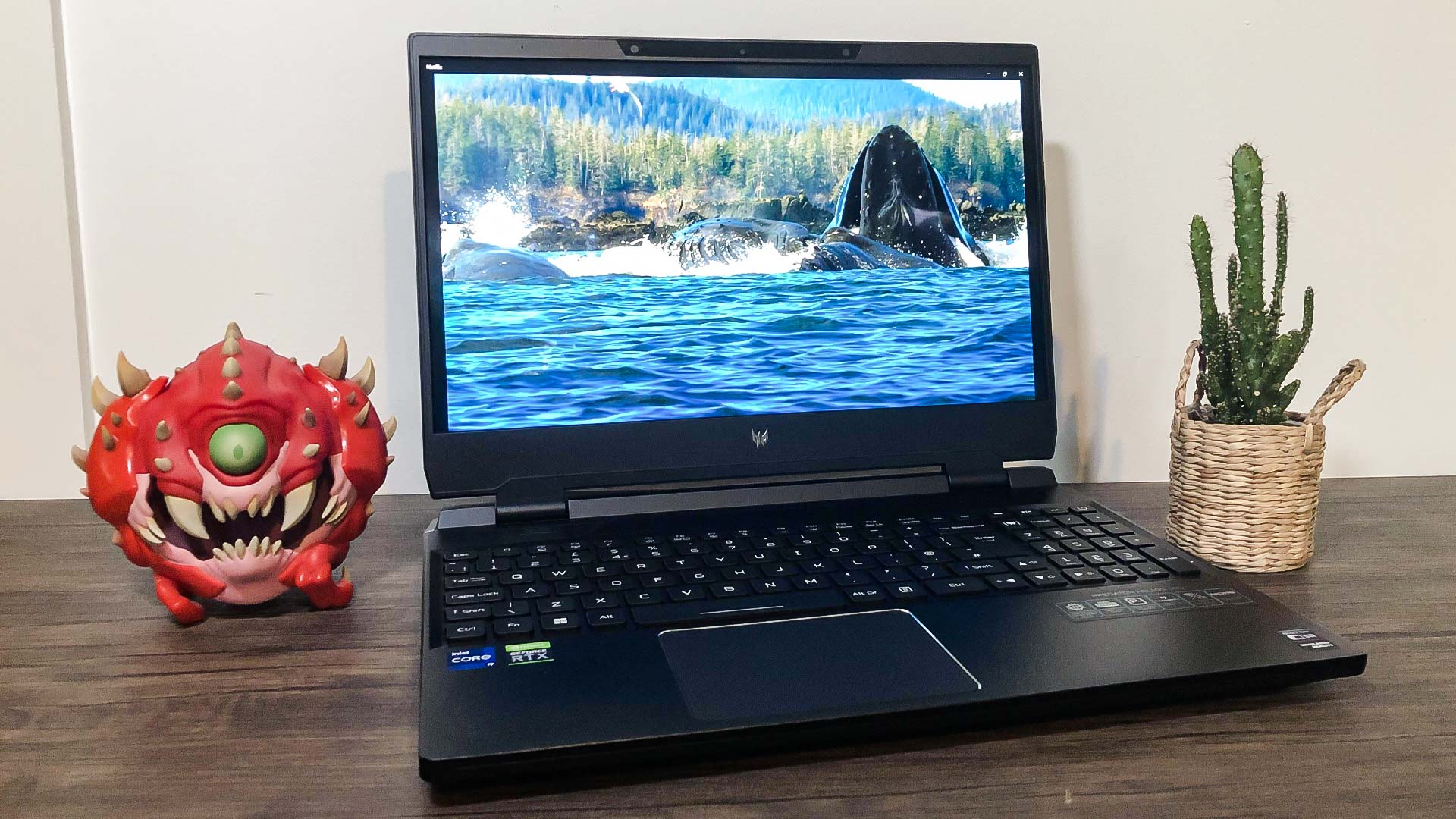
The strengths of the Helios 300’s screen are also undercut by middling black levels. An IPS panel is never going to compare to an OLED display, but the backlight bleed on our review unit is disappointing. Light leakage from the bottom left corner of the screen is particularly bad, especially when playing games in a dark room.
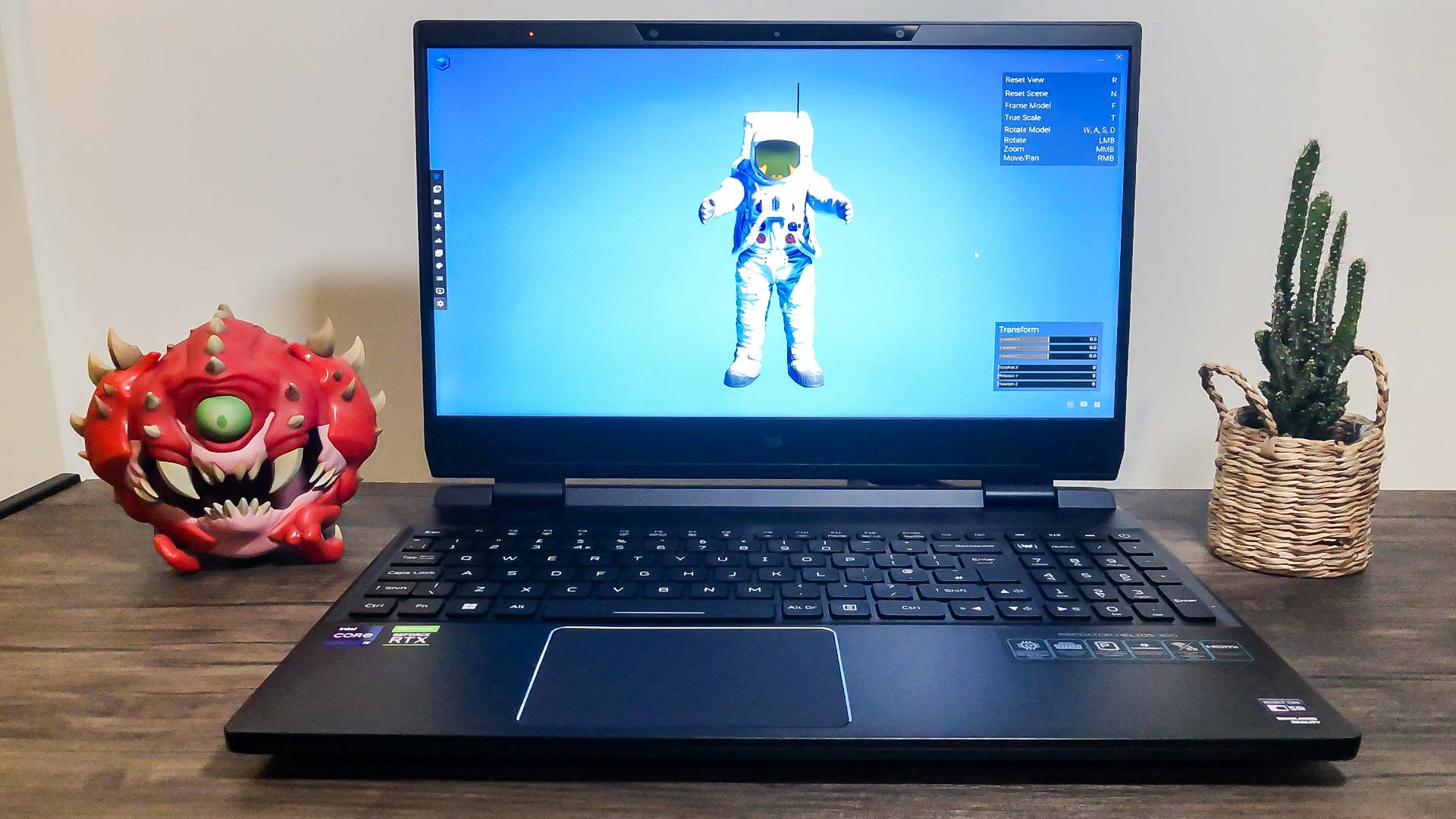
This lack of wow factor is backed up by our testing lab results. The screen measured in at an average brightness of 313.2 nits, which is distinctly… well, average. Compared to the likes of this year’s Dell XPS 17 or the Alienware m17 R5 — both of which are substantially brighter — it’s hard not to feel the Helios’ display lets this laptop down somewhat.
Brightness testing results
| Row 0 - Cell 0 | Avg. brightness (nits) | Peak brightness (nits) |
| Acer Predator Helios 300 | 313.2 | 320 |
| Dell XPS 17 (2023) | 522.8 | 564 |
| Alienware m17 R5 (2022) | 435.8 | 460 |
| MacBook Pro 16-inch (2023) | 446 | 1,476 |
The above results may disappoint, but at least the Helios 300’s display handles colors well. After playing a number of games on this high-end laptop, I’m impressed by how punchy they often appear. The searing reds of Doom Eternal’s hellscapes are particularly eye-arousing, while Grand Theft Auto 5’s perpetually sun-baked Los Santos looks pleasingly warm and inviting.
Our testing backs these impressive eyeball tests up with more than decent numbers. Our review unit can display 162.9% of the SRGB color gamut, 115.4% of the DCI-P3 gamut and a pretty strong Delta-E reading of 0.16 (the closer this number is to 0, the better). These results may not exactly be class-leading, but they’re certainly respectable.
Display testing results
| Row 0 - Cell 0 | SRGB | DCI-P3 | Delta-E |
| Acer Predator Helios 300 | 162.9% | 115.4% | 0.16 |
| Dell XPS 17 (2023) | 188.8% | 133.7% | 0.24 |
| Alienware m17 R5 (2022) | 107.5% | 76.2% | 0.21 |
| MacBook Pro 16-inch (2023) | 118.2% | 83.7% | 0.21 |
Acer Predator Helios review: 3D performance
- Stereoscopic 3D can be immersive for games
- Underlying tech issues dull the appeal of ‘glasses free’ 3D
The most unique selling point of the Helios 300 is its Spatial Labs 3D display tech. This is the first gaming laptop to support stereoscopic 3D. Even more impressively, this is ‘glasses-free’ 3D.
Nintendo may have beaten Acer to the punch by 12 years with the 3DS, but being able to play games in 3D without cumbersome glasses still feels like a thrilling novelty, even in 2023. Sadly, ‘novelty’ is the first word that comes to mind after messing about with Spatial Labs for a few hours.
While the pre-installed Spatial Labs Model Viewer provides cool distractions — you can view and manipulate 3D models of astronauts, skulls and tanks — it’s playing games in stereoscopic 3D that’s the real draw. It’s just a shame it’s an all too fleeting draw.
Around a dozen games in my Steam library support Acer’s Spatial Labs True Game software (there are currently 85 compatible titles), and the app is fairly straightforward to use. After choosing between the more performance-friendly 3D+ and the FPS-tanking 3D Ultra, I tested out the Helios’ 3D screen in Little Nightmares 2, Shadow of the Tomb Raider, BioShock Infinite and Project CARS 3.
Of that clutch of games, it’s Slightly Mad Studios’ racer that really impresses. The added depth of bombing around winding tracks in stereoscopic 3D is an immersive blast, and it’s the one game I tested that I’d happily play for hours in that wacky third dimension.
The rest fare less well. Little Nightmares 2 is simply too dark to thrive in 3D, while 3D Ultra tanked performance in Tomb Raider. I briefly enjoyed wandering the cobbled, cloud-scraping streets of BioShock Infinite’s Columbia, but prevalent 3D crosstalk — distortion that makes you feel like you’re seeing double —quickly cooled me on the experience.
That’s the main issue with the Helios 300’s stereoscopic tech: you have to sit at a dead-on angle to appreciate it. Move your head just a little away from the sweet spot in the center of the screen and crosstalk and headache-inducing blurriness quickly kick in. It’s a shame because when the 3D does work without issue, it’s a persuasive (if slightly gimmicky) effect.
Acer Predator Helios 300 review: Ports
- Future-proofing HDMI 2.1 connection is welcome
- A single Thunderbolt 4 socket feels stingy
Port selection on the Helios 300 is hit and miss.
You only get one Thunderbolt 4/USB-C port, located on the rear of the laptop, which feels uncharitable. You also can’t charge the Helios via USB-C, meaning you’re stuck with its seriously heavy power cable to juice this baby up. Not ideal.
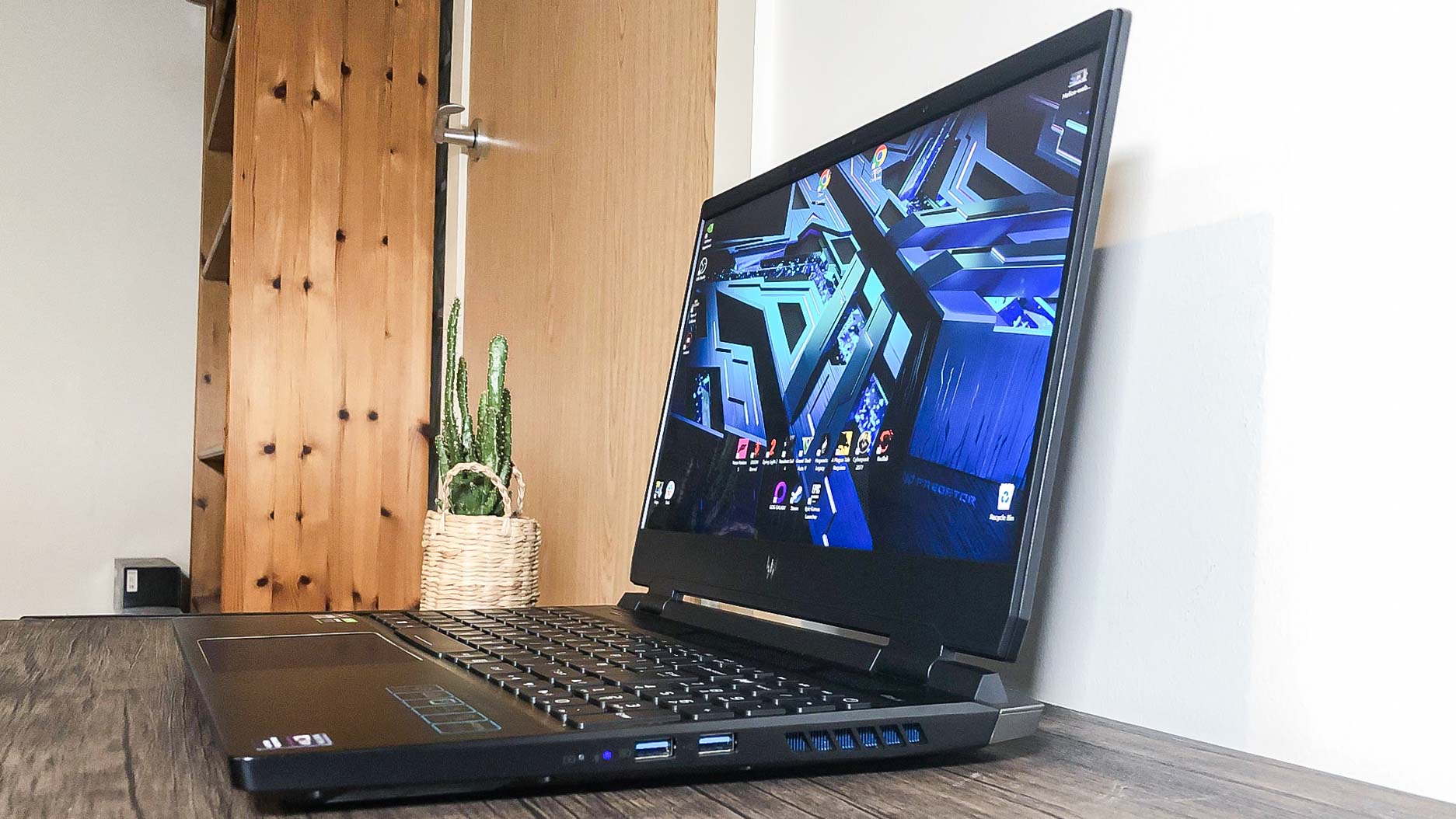
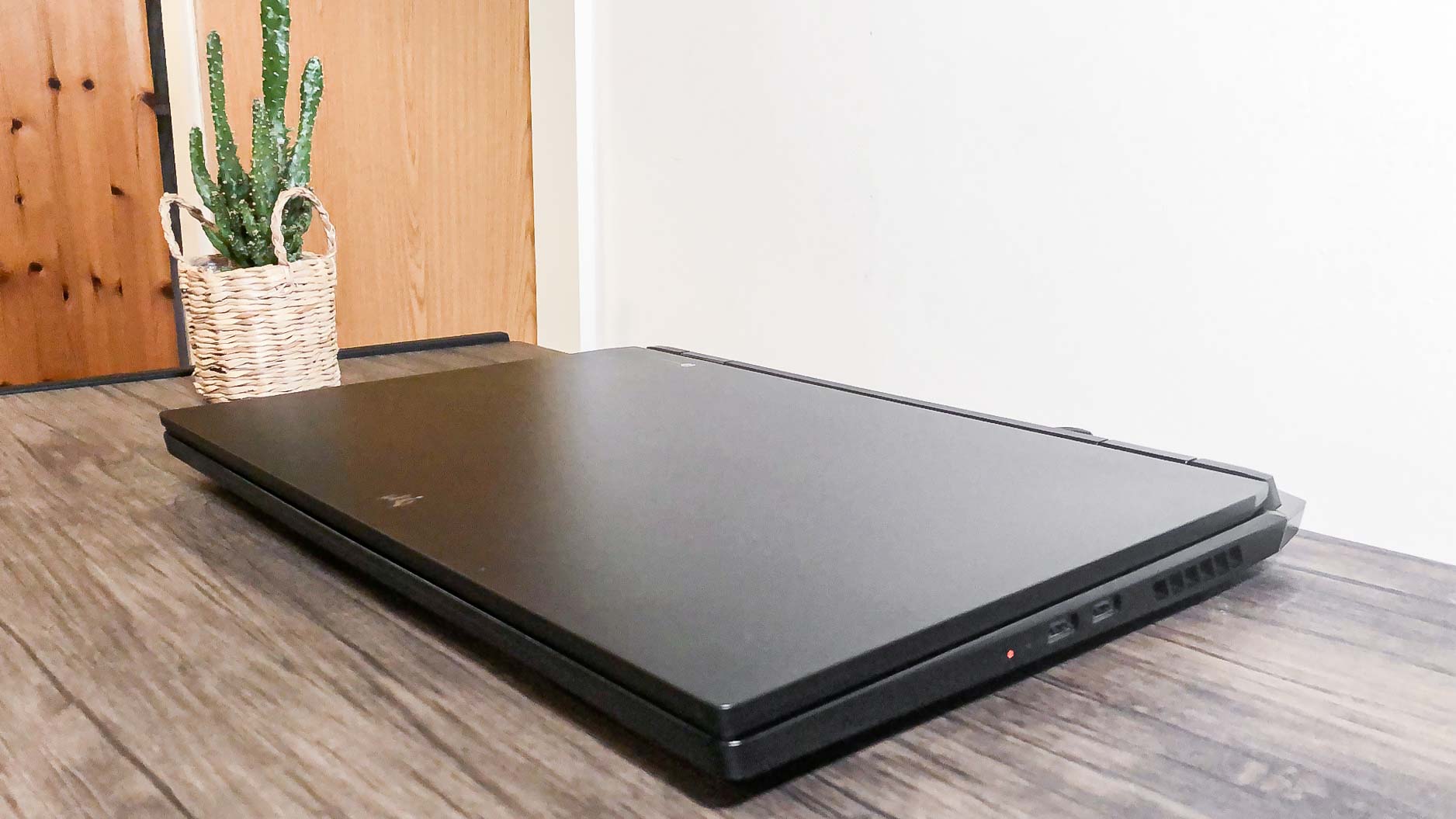
In better news, the laptop at least comes with three USB-A ports, a Mini DisplayPort 1.4, and most pleasingly, a single HDMI 2.1 connection. There’s also a 3.5mm audio jack on the lefthand side to service your headphone needs.
Acer Predator Helios 300 review: Keyboard and touchpad
- Both keyboard and pad are perfectly fine
- Responsiveness of touchpad reduced by 60Hz refresh rate
The nicest thing I can say about the Helios 300’s keyboard and touchpad? Neither of them offended me.
That doesn’t mean they don’t have their faults, it’s just nothing about the setup of the board or pad is all that egregious. Yes, I would have liked the keys to have slightly longer travel — typing on the Helios doesn’t feel all that satisfying — but they’re generally fine.
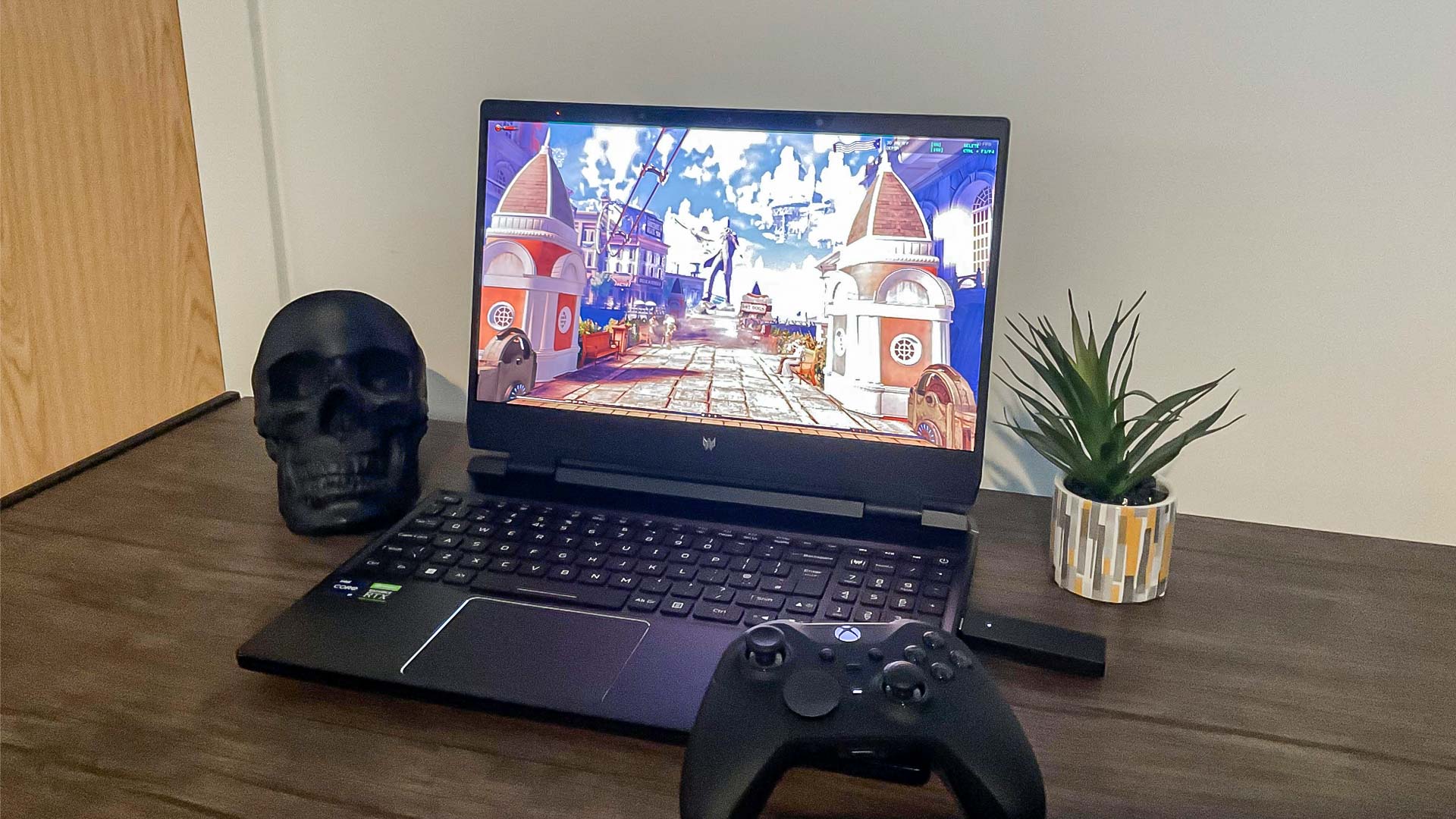
The touchpad is also perfectly decent, though it’s perhaps a little small considering the sheer real estate this laptop boasts. It also feels a little sluggish, so web browsing and general desktop navigation never feels quite as speedy as I’d like.
To finish on a more upbeat note, my inner gamer does appreciate the keyboard’s touch-sensitive mini LED lighting features. And yes, I am a walking cliché.
Acer Predator Helios 300 review: Gaming performance
- Stellar 4K gaming credentials
- 1440p / 120Hz would have struck a better balance
The Helios 300 is a stone-cold killer when it comes to gaming. I tested a handful of demanding, recent(ish) games on this laptop, and it more or less passed with flying colors in every single one.
Is a 4K screen on a 15.6-inch laptop somewhat overkill? Perhaps. If it was up to me, I’d choose 1440p/120Hz every time in the gaming laptop space. When you’re dealing with resolutions above 2K on smaller screens, there’s too much detail going on to easily pick out every last highlight — that’s why a 4K display is a little wasted on all but the largest laptop displays.
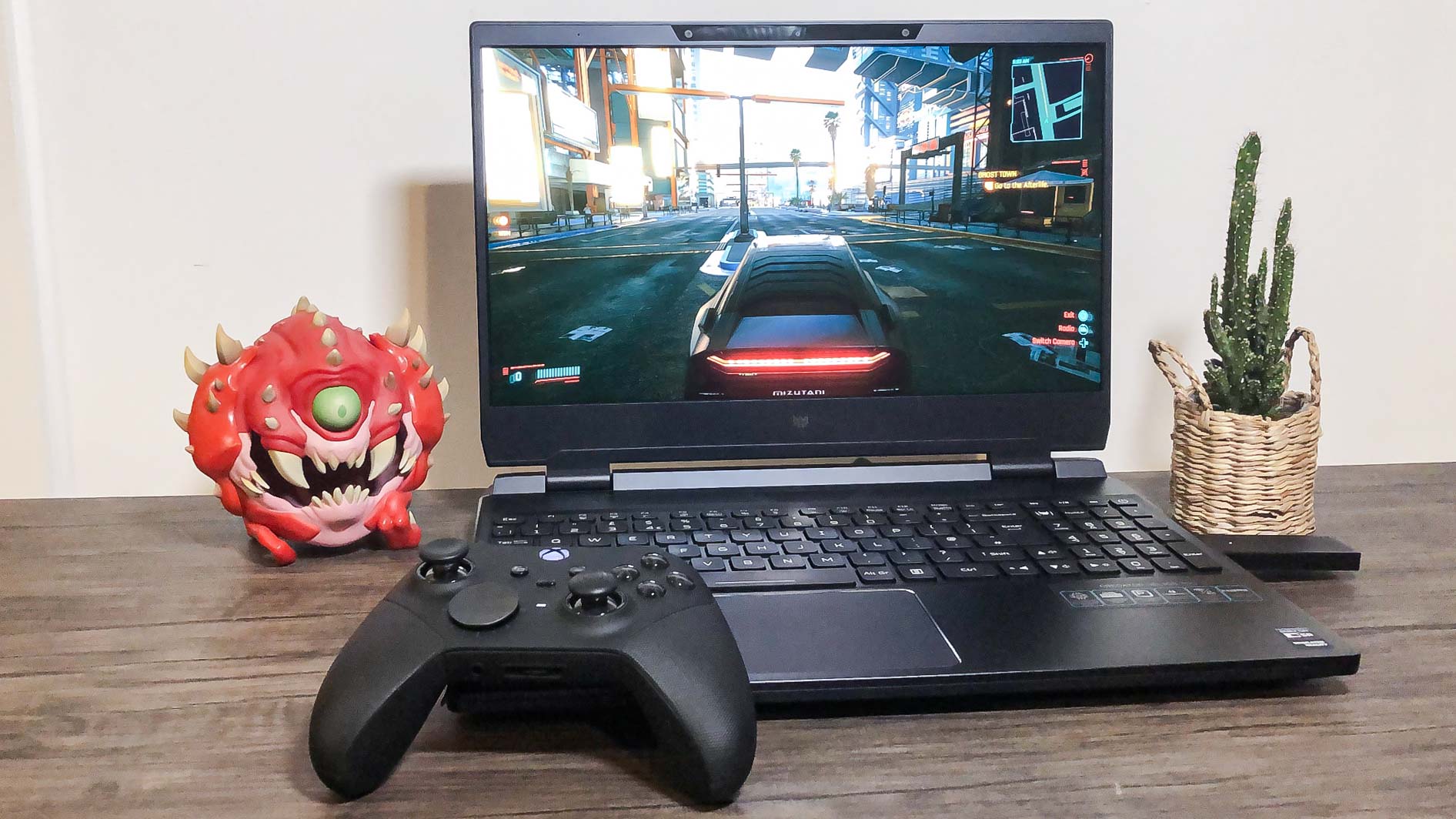
I’ve extensively tested Grand Theft Auto 5, Resident Evil 4 Remake, Doom Eternal, Cyberpunk 2077, Hogwarts Legacy and A Plague Tale: Requiem on the Helios 300 and only the latter fails to lock at a steady 4K / 60 fps. Those first five games run like a dream in Ultra HD, providing you use DLSS Performance mode when available and don’t mind dropping the odd setting from high to medium.
A Plague Tale: Requiem also comfortably locks to 60 fps when you lower the resolution to 1440p, and due to the size of the screen, I honestly had a hard time telling between 1440p and 4K.
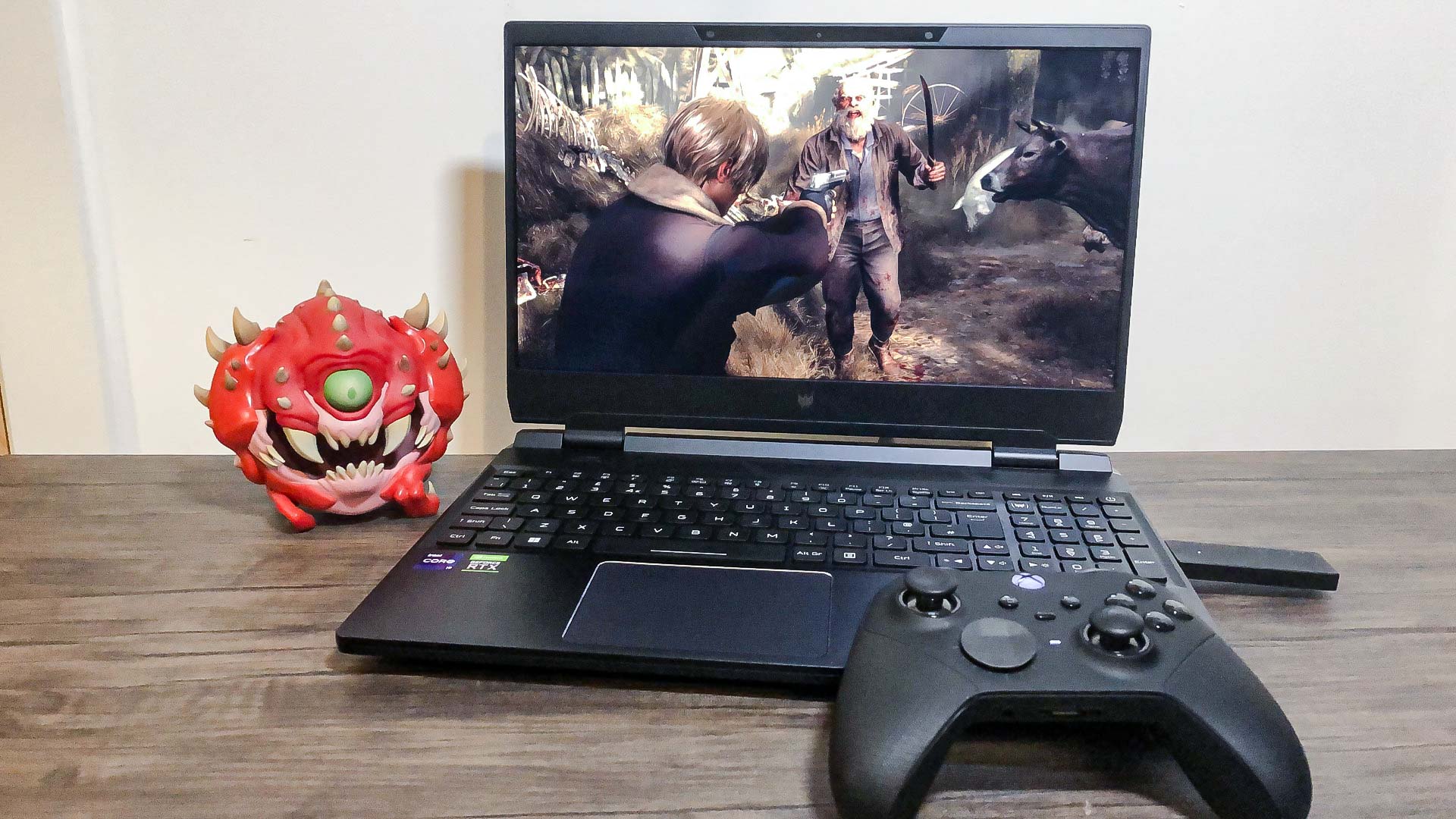
Just over 7GB of VRAM is slightly lacking when it comes to more demanding (and problematic) PC ports like the recent conversion of The Last of Us Part 1. Yet with slight tweaks, my Helios 300 review unit proves itself more than up to the task of delivering first-class 4K gaming experiences.
The Helios’ screen sadly suffers from ghosting, though. In every game I play, various levels of screen-smearing are evident when I pan the camera. Though it’s not a deal-breaker, the loss of clarity during sharp movement is disappointing. It’s also another reason I wish Acer had gone for an OLED display with its laptop.
Game performance testing (in FPS, @ 1080p and 4K)
| Row 0 - Cell 0 | 1080p | 4K |
| Assassin’s Creed Valhalla | 86 | 40 |
| Borderlands 3 | 92.78 | 37.11 |
| Red Dead Redemption 2 | 53.3 | 21.25 |
| Far Cry 6 | 79 | 42 |
| Grand Theft Auto 5 | 127 | 40 |
The testing results above paint a more pessimistic picture than my minute-to-minute gaming experience with the Helios. To caveat some of these results — especially Red Dead — you can claw back a lot of performance by enabling Nvidia DLSS.
Acer Predator Helios 300 review: General performance
- CPU performance stands tall
- Strong video editing and quick file transfers
Another area where the Helios 300 performs admirably. While I wouldn’t want to lug it into an office every day — I’m fairly sure it would crack my spine after a week — the numbers the Helios posted during our lab tests are impressive. This is a laptop that is easily powerful enough to steam through demanding daily workloads.
Thanks to that 12th Gen Intel Core i9-12900H CPU, the Helios hands in strong numbers in our Geekbench 5 multi-core benchmark test. A score of 13,830 can’t quite match the stellar performance of the MacBook Pro 16-inch (2023) — see the table below — but it comfortably beats competitors like the Alienware m17 R5 and Dell XPS 17 (2023).
Performance testing results
| Row 0 - Cell 0 | Geekbench 5 multi-core CPU | 25GB file copy speed test | Handbrake video editing time |
| Acer Predator Helios 300 | 13,830 | 1,580 Mbps | 4:30 |
| Alienware m17 R5 (2022) | 9,851 | 1,766 Mbps | 5:30 |
| Dell XPS 17 (2023) | 13,299 | 2,086.6 | 5:10 |
| MacBook Pro 16-inch (2023) | 15,044 | N/A | 4:03 |
| Asus ROG Zephyrus G14 | 10,004 | 1,260 Mbps | 5:48 |
The Helios 300 also performs well in our disk speed test, where we test how quickly a laptop can duplicate 25GB of multimedia files. Our unit hit a respectable top speed of 1,580 Mbps, which is reasonably speedy.
Our video editing test also produced a decent result, with our Helios unit transcoding a 4K video file to 1080p using Handbrake in only 4 minutes and 30 seconds. That’s comfortably better than the gaming-focused Alienware m17 R15, though again short of the blistering time this year’s MacBook Pro 16-inch delivers.
Acer Predator Helios 300 review: Battery life and heat
- Battery life is nowhere near good enough
- Heat output could melt your lap
There’s no nice way to put this: battery life on the Helios 300 can be painful. I’d go as far to label it as unacceptable in certain scenarios. This laptop’s impressive gaming pedigree comes at a price, and said toll is a 90Wh Li-on battery that drains faster than a Nintendo Switch.
I understand that a machine with so much impressive tech under the hood is going to be power-hungry, but when we got this to the lab, the results weren’t pretty. For a laptop this big to measure in at an average battery life of 3 hours 59 minutes while web surfing simply isn’t good enough.
The results only get worse when you start playing games on the Helios. During our standard PC Mark 10 gaming tests, Acer’s laptop ran out of juice after just 88 minutes. If you’re planning to do any serious gaming on the Helios, you’ll need to be in close range of a power cable at all times.
| Row 0 - Cell 0 | Time (hours:mins) |
| Acer Predator Helios 300 | 3:59 |
| Dell XPS 17 (2023) | 9:05 |
| LG Gram 17 Pro (2023) | 12:02 |
| MacBook Pro 16-inch (2023) | 18:56 |
| Lenovo Legion Pro 5i | 4:51 |
| MSI Katana 15 | 2:39 |
| Asus Zenbook 14X OLED (2023) | 8:24 |
Things don’t get any rosier when it comes to heat readings. Not only is the Helios distractingly noisy under load, it also runs at uncomfortably hot speeds. Generally, we consider readings under 95 degrees to be acceptable for day-to-day usage during our heat tests and the Helios 300 was nowhere near limboing under that target.
Acer’s laptop clocked in at a high of 100 degrees during non-gaming tasks, with its underside getting particularly toasty. Proceedings only get more sweltering when booting up a game, with our heat tests maxing out at a semi-ludicrous 126 degrees while playing Metro Exodus: Enhanced Edition.
Mercifully, I never placed this unit on my lap. If I had, I’m not too sure I’d still have functioning lower extremities. These numbers just don’t cut it. During one absent-minded moment, I placed my Xbox Elite Wireless Controller Series 2 next to the Helios’ side vents, which turned out to be a big mistake. Minutes later, my gamepad felt like it had just been stuck in a microwave.
When it comes to both battery life and heat output, the Helios 300 fails hard.
Acer Predator Helios 300 review: Audio
- Speakers lack punch
- Noisy fans dominate most sounds
Another area where the Helios 300 disappoints. Considering its size, audio on this Acer underperforms. Its speakers are tinny, lacking any real bass — meaning sounds often get drowned out by those exceptionally noisy fans.
During a UK ‘90s retro binge, my ears are promptly disappointed when listening to various tunes from Oasis, The Cranberries and Fatboy Slim. There’s just no authority to the Helios 300’s soundscape, and my smaller, far slimmer iPad Pro (2021) runs circles around it in the audio department.
Acer Predator Helios 300 review: Webcam
- Despite only being 720p, webcam is surprisingly sharp
- It’s a pity it’s not 1080p, though
Ah yes, time to look at my silly Scottish face again. The 720p webcam built into the center of the Helios’ top bezel may not rock the best specs, but it offers more clarity than I was expecting from a sub-1080p cam.

The picture is perhaps a little overexposed at times — this webcam makes me look like a sentient piece of beetroot after a recent bout of sunburn. Still, images are generally sharp, and there’s little smearing or artifacting during video calls.
It might be a workmanlike webcam, but it gets the job done. And yes, I am in dire need of a haircut.
Acer Predator Helios 300 review: Verdict
The Acer Predator Helios 300 Spatial Labs is a gaming powerhouse. If you want to experience demanding modern games at 4K / 60 fps with minimal compromise to settings, this is the laptop for you. As an all-rounder, though, it’s hard to fully get behind the Helios.
Though it posts strong numbers during our productivity tests, design flaws hamper this laptop’s ability to cement itself as a great all-rounder. Weight, noise and heat issues mean this Acer essentially eliminates itself from easy day-to-day usage before you factor in a single performance metric.
This is one of the least subtle laptops I’ve ever seen, and I both admire and resent that about the Helios. If you’re serious about PC gaming — and have money to burn — the allure of this machine’s specs is strong. At the same time, I can’t help but feel your money would be better spent elsewhere. For roughly what Acer is asking for the Helios 300, you could buy a Steam Deck, one of the best OLED TVs and a PS5.
Maths may not be my strong point, but I know where my $3,500 would be going to scratch my gaming itch.

Dave is a computing editor at Tom’s Guide and covers everything from cutting edge laptops to ultrawide monitors. When he’s not worrying about dead pixels, Dave enjoys regularly rebuilding his PC for absolutely no reason at all. In a previous life, he worked as a video game journalist for 15 years, with bylines across GamesRadar+, PC Gamer and TechRadar. Despite owning a graphics card that costs roughly the same as your average used car, he still enjoys gaming on the go and is regularly glued to his Switch. Away from tech, most of Dave’s time is taken up by walking his husky, buying new TVs at an embarrassing rate and obsessing over his beloved Arsenal.
